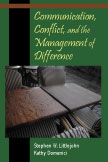“I have been searching for a theoretically informed, applied, interesting, and well-written text on conflict. And I’ve finally found it. I will be adopting it.” — Natalie Nelson-Marsh, Portland State University
“I am impressed with this book. It takes a mature, broad, and deep approach to conflict and communication without losing that critical quality of any useful text: accessibility. The best I’ve seen in many years of teaching this course.” — John V. Modaff, Morehead State University

334 pages, $44.95 list
1-57766-503-1
978-1-57766-503-8
© 2007
paperback
eBook availability
Similar Titles
Also by
Kathy Domenici
Kathy Domenici
Communication, Conflict, and the Management of Difference
Littlejohn and Domenici invite readers to engage in a thoughtful dialogue about human difference, conflict, and communication. Drawing on numerous examples from their work in mediation, the authors discuss a variety of practical tools, models, and theories to help analyze conflict—why it occurs and how communication skills help avoid downward spirals into harmful relationships. Communication competence can move discussions away from harmful interactions and empower parties to expand their options. Effectively managing differences allows conflict, in whatever context, to become a positive resource rather than a barrier.
The appendix provides a wealth of information in a succinct format. It discusses basic communication skills; introduces a number of alternative dispute resolution methods, including negotiation, mediation, facilitation, collaboration, and public engagement; and concludes with practical information about dialogue as an important approach to differences.
The appendix provides a wealth of information in a succinct format. It discusses basic communication skills; introduces a number of alternative dispute resolution methods, including negotiation, mediation, facilitation, collaboration, and public engagement; and concludes with practical information about dialogue as an important approach to differences.
Reactions
Part I. UNDERSTANDING CONFLICT
1. Conflict: When Differences Challenge Us
Beginning to Think about Conflict / Our Definition and Model: The Management of Difference / Types of Conflict / Approaches to Conflict
2. The World of Difference
A Way of Thinking about Communication / The Communication Ecosystem / Managing Conflict
3. Taking a Systems View
A Little System Theory / How System Theory Changes What We See / Making Connections across Time / Intervening in a Conflict / Trends in Conflict Management
4. A Closer Look at the Conflict System
Conflict Styles / Message Strategies / Emotions / The Social Environment / Culture
5. Communication and the Challenge of Conflict Management
Beginning with a Metaphor / Patterns of Communication in the World of Difference / Facework and the Management of Difference / Communication Processes in Conflict Management
Part II. MANAGING CONFLICT: From Harm to Value
6. Moving toward Value in Relational Conflicts
Managing Contradictions / Relational Patterns of Interaction / The Emotional Side of Relational Conflict / How to Manage Relational Conflicts
7. Moving toward Value in Family Conflicts
What Is a Family? / The Family System / Responding to Demands / Conflict and Privacy Management / Parenting and Conflict / Divorce / Family Violence / Managing Family Conflicts Effectively
8. Moving toward Value in Organizational and Community Conflicts
The Value of Conflict / A System of Stakeholders / Interpersonal Responses to Conflict / Institutional Responses to Conflict / Community Conflict and the Management of Public Issues
9. Moving toward Value in Global Conflicts
The Personal in the Global / Defining Intergroup Relations / The Bases of Global Conflict / Global War and Peace
Part III. KEEPING DIFFERENCES AFFIRMATIVE
10. Transcendence and Transformation
Transcending Clash / Transforming the Relationship
11. Reorienting the Difference
From Static Culture to Culture-as-Process / From Resolution to Engagement / From Resolution to Transformation / From Cynicism to Civility / From Solutions to Platforms
Appendix: A Guide to Practical Skills and Methods for Conflict Management
1. Conflict: When Differences Challenge Us
Beginning to Think about Conflict / Our Definition and Model: The Management of Difference / Types of Conflict / Approaches to Conflict
2. The World of Difference
A Way of Thinking about Communication / The Communication Ecosystem / Managing Conflict
3. Taking a Systems View
A Little System Theory / How System Theory Changes What We See / Making Connections across Time / Intervening in a Conflict / Trends in Conflict Management
4. A Closer Look at the Conflict System
Conflict Styles / Message Strategies / Emotions / The Social Environment / Culture
5. Communication and the Challenge of Conflict Management
Beginning with a Metaphor / Patterns of Communication in the World of Difference / Facework and the Management of Difference / Communication Processes in Conflict Management
Part II. MANAGING CONFLICT: From Harm to Value
6. Moving toward Value in Relational Conflicts
Managing Contradictions / Relational Patterns of Interaction / The Emotional Side of Relational Conflict / How to Manage Relational Conflicts
7. Moving toward Value in Family Conflicts
What Is a Family? / The Family System / Responding to Demands / Conflict and Privacy Management / Parenting and Conflict / Divorce / Family Violence / Managing Family Conflicts Effectively
8. Moving toward Value in Organizational and Community Conflicts
The Value of Conflict / A System of Stakeholders / Interpersonal Responses to Conflict / Institutional Responses to Conflict / Community Conflict and the Management of Public Issues
9. Moving toward Value in Global Conflicts
The Personal in the Global / Defining Intergroup Relations / The Bases of Global Conflict / Global War and Peace
Part III. KEEPING DIFFERENCES AFFIRMATIVE
10. Transcendence and Transformation
Transcending Clash / Transforming the Relationship
11. Reorienting the Difference
From Static Culture to Culture-as-Process / From Resolution to Engagement / From Resolution to Transformation / From Cynicism to Civility / From Solutions to Platforms
Appendix: A Guide to Practical Skills and Methods for Conflict Management